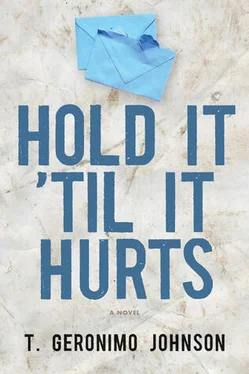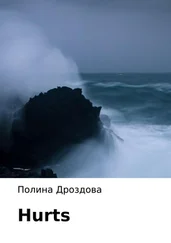Achilles, who had nearly begun hyperventilating when he realized he was unarmed, shook his head.
When the man asked again, Achilles said, “No!”
“You seen him?”
“I don’t know anyone named Lionel,” barked Achilles.
“If you see him, let him know I’m still here.”
“Yeah, sure.” As he searched the other rooms, he moved with caution, his adrenaline high, his fingers twitching. He was surprised to find it otherwise deserted. Why did they all congregate on the same mattress? He passed that room on the way out. The man in the POW-MIA T-shirt was trying to stick the foil back up, muttering. He pressed it against the glass, but it flopped down. He tried smoothing it out with his hands, and it tore. He spat on the window, and tried again, but it fell. When Achilles heard a sob, he cast the flashlight toward the window. When the beam crossed his face, the man flinched and slapped at his cheek as if an insect had landed. “Lionel?”
“I’m not Lionel.”
“You seen him?”
“No,” said Achilles.
“Tell him I’m still here. Tell him Norm is here.”
Achilles turned away.
“Sure, I will. I’ll tell him.”
Once outside, using one hand to steady the other, he made an X on the map, having checked the last house on the block. He had recorded the creases in overgrown lots, the runs that cut through otherwise impassable alleys, the winding trails that wound across vacant plots and between houses. Ultimately, every path led back to one place. Every street that ended without warning — Medgar Evers Avenue, MLK Boulevard, and Malcolm X Way — dead-ended at Banneker Homes, suddenly colliding with that brick wall as if it had been planned this way, as if the housing project had fallen from the sky whole, like a box trap. When Achilles finished correcting the map, the Bricks stood in the center like a bitter black heart.
WAGES AND TROY SOFTLY HUMMED “MAMMAS DON’T LET YOUR BABIES Grow Up to Be Cowboys.” Merri muttered the Psalms. Wexler said, “It looks like someone ripped a pillow open.” From where Achilles lay, he couldn’t see Wexler’s face, but knew that Wexler was referring to the puffs of clouds scattered across the horizon, white wisps sweeping westward, occasionally revealing the low, full moon. The squad’s position in a shallow cave offered a prime view of the piedmont below, dotted with brush and squat red dunes with low vegetation rounding their bases, like receding hairlines. The mountains on either side of the plateau vanished at the horizon long before meeting, forming a huge channel leading to the end of the earth. Gradually, the clouds retreated to the edge of that channel, bunching up like a blanket, revealing the moon high above, one perfect circle. Three goats crested a dune and stopped, as if they too admired the view.
And it was breathtaking, this valley laid out before them like a tapestry, the gently undulating land, the high ridges on either side, and in the middle of it, one small village of only five buildings illuminated by flickering oil lamps, the only sign of human life, and above it the biggest sky he had ever seen, a dark sheet with that perfect sphere of light in the center like a watchful eye. The next morning a thin layer of mist hugged the hills. Watching the rising sun burn it off, he recalled the dawn vistas from the highway behind his home, the trees wavering behind a veil of fog like the shadows of people who weren’t there, the three rocks in the lake lined up like the back of a mythical beast preparing to surface, and it was all so stunning that as he fell asleep in that cave beside his brother, as he had those first few days before Troy’s bed arrived, it was hard to believe someone out there was trying to kill them.
How had it started? Everyone blamed someone else. They were walking along, then a landslide, and next thing they knew, someone was firing at them. Then, as Merri later described it, it was quiet as the night before Christmas in the mofo. They tried to move a few times, but every time they did, the firing started again. Wages called it in and they waited for the money shot, watching that sunrise, all of them, side by side, tuned in like it was the best movie they ever saw. And Achilles forgot for a few moments that he was on Mission ZF1983—his birth year — and that he was trapped by bad decisions or fate or intel no more accurate than the maps on a child’s place mat.
He felt equally trapped in the stifling attic at Wexler’s jobsite, hemmed in by the fear — foolish, he knew — that he needed to see Troy before Troy saw him. He was also unsettled by the suspicion that with all his drug talk, Wexler was hiding something; and he was angered by Ines’s sudden decision to come to Atlanta, which he resented because he’d need to stop his search and find a hotel room. “Doesn’t your mother need you?” he’d asked. Her answer: silence. His thought: Who ever heard of a little rain driving people out of town?
The lunch bucket was setting up in the partially paved lot across the street, the doors unfolding upward like quilted silver wings glinting in the sunlight. He watched the lunch line grow in clusters — the sheetrockers coated in white dust; the painters in their dappled whites; the masons in their gray, dusty overalls; and Wexler, who stood alone, yet spoke easily with everybody. A gaunt gray dog, ears tattered like pom-poms, wandered the lot, dodging kicks and stopping to sniff the occasional rock tossed its way. An old man sucked a packet of mayonnaise like it was a pig’s foot, licking each finger when done. Others did the same, collecting and trading condiments, which he hadn’t seen in New Orleans. But he was always at locations where food was given away.
At the edge of the lot, at rapt attention, stood a man draped in desert BDUs that hung on him like curtains. The pant legs, rolled up to midcalf, rattled around his thin shins like bells. Achilles moved from dormer to dormer, scanning near and far, looking at everyone again and again, as if studying a check for an extra zero. A sheetrocker had Troy’s profile, a painter his gait, a mason his habit of pulling on his earlobe when waiting in line, and a beggar the same tilt of the head just before telling a joke. When the men in line around him laughed, Achilles’s throat constricted as if he’d swallowed a pinecone. A gold Hummer cruised by and in its wake the bubble of laughter collapsed, lips tightening and necks twisting, as if it were a hearse.
Wexler came up with two Styrofoam containers, offering one to Achilles. His mouth watered at the smell of fried food, but he wanted to remain light, coiled, and ready to spring.
“I don’t eat that crap anymore.” He’d long ago said good-bye sloppy joes, pot roast, cheesy hot dogs; hello muffuletta, jambalaya, stuffed mirliton.
Wexler patted Achilles’s stomach. “Can I make a wish?”
It was true, he spent less time in the gym and more time in the kitchen. But it was hard not to. Until Ines, he’d never known what it meant to really want to be with somebody, to have somebody just for him. To get up and have a common routine, to be in the same circle. He and Janice were never completely in the same circles. “Life is good.”
“Yep.” Wexler stood in the sunniest dormer and ate, chewing loudly, attacking the chicken like a big cat. He always ate like he was happy to be alive.
Achilles kept moving around the attic, watching the surrounding streets, examining every profile. When the lunch bucket folded up its wings and trundled off, there was still no sign of Troy. The workers drifted off. The homeless men who had been standing at the edge of the lot swooped in, kicking the dog out of the way.
Achilles sat on an overturned bucket across from Wexler. Achilles had been up all night and felt the fatigue setting in as soon as the lunch bucket left. His muscles were smoldering, aching, and burning. “He’s here. I can feel it.”
Читать дальше












